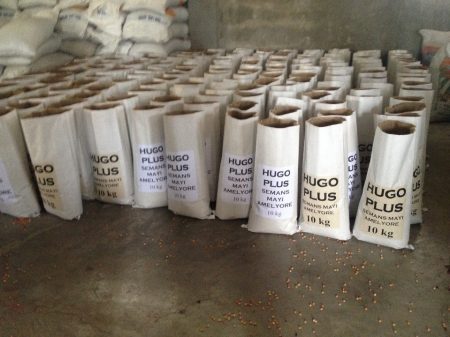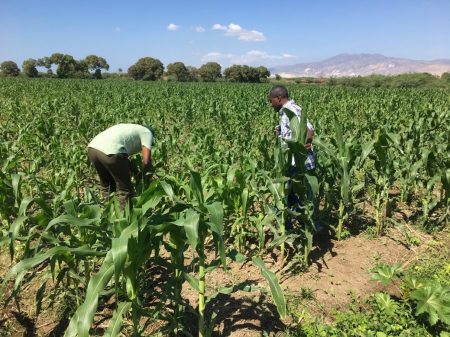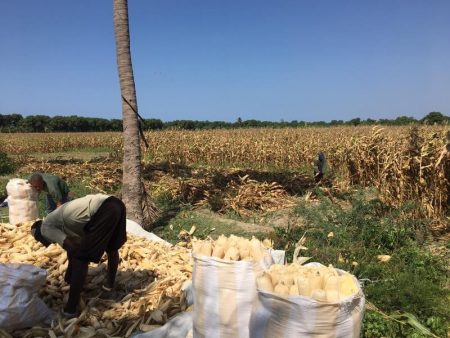
MEXICO CITY (CIMMYT) – The International Maize and Wheat Improvement Center (CIMMYT) has grown 150 tons of renewed, improved maize seed that will be sent to Haitian farmers to help jump-start the country’s seed sector, improve local food security and decrease malnutrition. This will be the largest seed shipment to any country in CIMMYT’s history.
In 1998, CIMMYT, together with the Organization for the Rehabilitation of the Environment, introduced a new quality protein maize variety in Haiti. Named “Hugo” for CIMMYT maize breeder Hugo Córdova, the variety grew well under the island’s agro-ecological conditions and can decrease malnutrition and stunting among children that consume it. The product of decades of maize research in Haiti and Latin America, Hugo quickly became a favorite among farmers, but over time lost its genetic purity due to a lack of certified seed production and yields began to drop.
Now, CIMMYT is working to help Haiti build their seed sector from the ground up, from developing improved seed to replace old varieties to providing capacity development at every level of the maize seed value chain, with incredible results.
Haiti is the poorest country in Latin America and the Caribbean, with the lowest maize yields in the continent, and roughly 50 percent of the population is undernourished. These conditions have been exacerbated by a crippling earthquake in 2010, what is emerging as a longstanding drought, and devastating Hurricane Matthew in 2016 that affected 2 million people. According to the United States Agency for International Development (USAID), Haiti cannot achieve economic growth and national stability if food security is not addressed.
However, improving food security in Haiti is complicated by the fact that there are no formal seed companies, said Alberto Chassaigne, maize seed system specialist at CIMMYT.
“Farmers often sell their entire crop at harvest, leaving nothing for the next season, forcing them to plant simple maize grain that they buy from local markets rather than certified seed, drastically reducing yield over time,” said Chassaigne.
In 2015, CIMMYT launched the Mayi Plus initiative with the support of USAID-Haiti Feed the Future (FTF) to identify the most promising varieties for the future of maize farming in Haiti. The project would also work to produce a “renewed” Hugo to farmers in Haiti with greater genetic purity and yield, and provide capacity development to Haitians in the production and processing of seed of these improved varieties. This renewed Hugo, known as “Hugo Plus,” can produce up to seven tons per hectare, in comparison to traditional varieties currently planted in Haiti that produce on average less than one ton per hectare.
Through a systemic series of maize trials, scientists also found that new CIMMYT germplasm is already available that outperforms any other maize available in Haiti in both irrigated and rain-fed conditions. These resilient varieties, named “Mayi Plus I” and “Mayi Plus II” are currently under multiplication to be introduced to Haitian farmers as soon as possible.

Four tons of renewed Hugo were produced in 2015, 2.7 tons of which were produced in Haiti.
In the winter cropping season of 2016-2017, CIMMYT produced 150 tons of renewed Hugo seed in Mexico to send to Haiti, 50 percent more than the 100 tons they had planned to send. “This is the largest seed shipment ever sent by CIMMYT,” said Arturo Silva Hinojosa, leader of the International Maize Improvement Consortium in Latin America. “An additional 15 tons of seed will be harvested in Haiti, up from 0-3 tons in previous years.”
20 of the 150 tons of renewed “Hugo Plus” have already arrived in Haiti, where they will be sold to farmers at affordable prices in “agricultural input boutiques” established by FTF and partners. The remaining 130 tons will be used by CIMMYT and FTF to develop a strategic seed reserve in Haiti that will serve as a backup in case of natural disasters so that the country has immediate availability of seed stock for re-planting. The CIMMYT team in Haiti is currently working to find the best locations to store the strategic maize seed reserve.
To ensure that the genetic purity of renewed Hugo and other improved maize varieties will be maintained, CIMMYT is providing capacity development to help start Haiti’s seed sector from scratch. Project partners identified entrepreneurs interested in establishing a seed enterprise, and CIMMYT has been providing these entrepreneurs with in-depth training in seed processing and marketing, guidance on the infrastructure for a seed processing plant, and contacts throughout the world of equipment appropriate for Haitian conditions.
In addition, CIMMYT established a two-week course in seed production and seed processing with a FTF partner to train 13 Haitian technicians, who will now be able to train other Haitians interested in working in the country’s maize seed sector. A training manual is being prepared in French and Creole, and replication workshops will be conducted in target food security corridors of USAID in Haiti.
“This improved seed, and a self-sustaining seed sector capable of producing and marketing it, can contribute towards improved foreign exchange savings and will create local employment,” said Huntington Hobbs, former leader of strategic planning and research coordination for CIMMYT’s MasAgro project. “Increased maize production will bolster Haiti’s economy by providing feed for emerging industries in poultry and egg production, as well as the main staple of Haitian food security.”

CIMMYT researchers returned to Haiti in early June to advise seed companies on the installation of a seed processing plant, as well as to supervise trials and evaluations of new varieties and coordinate trainings in Haiti with trainers trained last February in Mexico.
In order to introduce local farmers to the new Hugo Plus maize variety and recognize CIMMYT’s contribution to Haiti’s food security through the Mayi Plus project, the USAID-Haiti Feed the Future Chanje Lavi Plante (CLP) project held a special event on June 21, 2016. The event was attended by farmers, agricultural input store managers and local partners, as well as staff from the Haitian Ministry of Agriculture and USAID who thanked CIMMYT for the recent 20 ton seed shipment.
“Hugo Plus is the result of many years of applied research work of CIMMYT in Haiti, and is a valuable alternative to the current varieties available in Haiti with such low yields,” said Micheal Wyzan, head of the office of economic growth and development at the Haiti mission of USAID. “We highly appreciate the fruitful collaboration between CIMMYT and the CLP project that allow farmers to increase their maize yields in the region.”
In his address to the audience, Alain Thermil, main liaison of Haiti’s Ministry of Agriculture with USAID, stated that, “CIMMYT is a very important organization in the world, and it is vital to Haiti that we establish and maintain a close relationship with CIMMYT.”
Jean Robert Estime, director of the CLP project in Haiti, agreed. “Through CIMMYT interventions, good quality seed is now available to farmers in Haiti. We are very grateful to CIMMYT, a great international organization with a mandate to do research on maize and wheat worldwide that is doing very important work in Haiti.”
 Capacity development
Capacity development